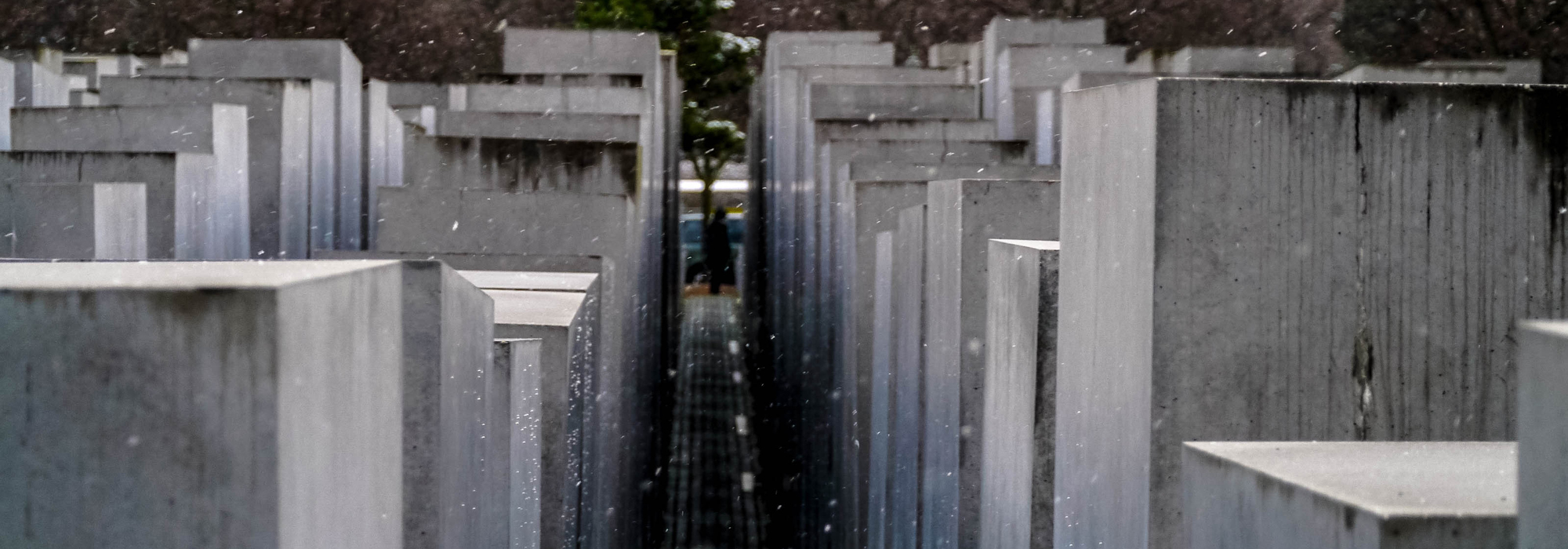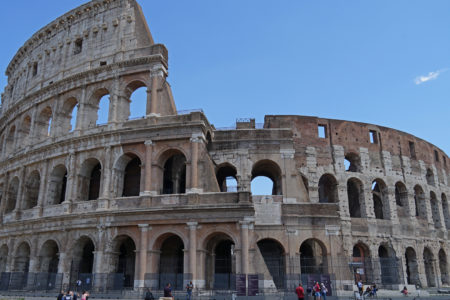
Throughout Berlin, there are small metal squares on the sidewalk in front of the former homes of Holocaust victims — permanent mini-memorials recalling that history. There is a saying in Berlin to “never trust green space”: that what at first might appear to be a nice public park may actually be the site of a past horror, a memorial, or a vast collection of human remains.
You can walk the streets of Berlin without observing much of this hidden history — but once you dig deeper and become more aware of your surroundings, it becomes impossible not to sense its presence. Germany lives in the shadow of great evil — great evil done to its own citizens, great evil perpetrated by the German state, and great evil perpetrated or simply ignored by many German individuals.
Most nations develop and promote a quasi-mythical story of their glorious history. Some ignore or deny past errors, some seek to qualify them, and some openly acknowledge them while still putting them in the context of a positive view of their national identity. But Germany does not seem interested in developing a positive story of its past. Its history is so marred by Nazi horrors that it does not even try to create a positive, historically grounded national narrative. This attitude is unusual — and perhaps is the result of Germany’s traumatic experience. But Germany’s reckoning with past evils can inform debates about monuments and memorials in other countries, including Canada, because its approach to that reckoning can help us perceive what it could look like in other contexts.
My own great-great-grandfather was a proud German and decorated First World War veteran. Younger men than he were conscripted to fight in that war, but he volunteered. He was also a Jew, and was driven to suicide in 1940 as his only alternative to “deportation.” I suspect he would strongly approve of the way the modern German state recognizes and remembers past crimes. However, I wonder if he also would have wanted to see more recognition of the good Germany which never ceased to exist or to resist, in spite of the Nazis’ efforts.
It would be possible to lionize in a larger and more obvious way the work and courage of Germans who resisted the Nazis, describing them as representatives of a “true Germany.” Modern Germany does remember these people, but it could do more. It would seem appropriate to place prominent statues of anti-Nazi figures such as Clemens von Galen, Sophie Scholl, Josef Müller, Dietrich Bonhoeffer, and the Rosenstrasse protestors among the various memorials in central Berlin. These were German heroes who demonstrated great courage and, in their view, unrelenting patriotism in the face of a Nazi dictatorship that wanted to destroy Germany’s real national virtues. Such statues might be adorned with German flags, highlighting the German-ness of these figures. In many countries, flags are a normal part of the urban landscape — but in Berlin, German flags are almost nowhere to be seen.
Any concept of the “true Germany” would need to be properly contextualized. The evils of that period were not simply imposed by a small cadre of Nazis — many ordinary Germans went along with or enabled the regime. Still, many nations highlight the positive figures in their past as examples for the present, even if those figures did not represent majority sentiment. Germany’s brave resisters wanted others to know that there was still a decent Germany.
Some might debate whether the creation of a positive national narrative actually matters. But perhaps the lack of a positive concept of national identity rooted in history leaves the door open for more extreme manifestations of nationalism. Perhaps the absence of positive historic national myths also leads to policy decisions that do not preserve vital national interests.
Germany’s past and the way in which it is remembered have profound implications for modern German and European politics. Consider the Brexit debate. The British, even “Remainers,” seem to view the European Union as a political choice rooted in a question of economic interest. But many Germans have a different attachment to the EU. They see it as ensuring the continuation of peace — binding them and other nations into a transnational concept of law and human rights. My impression is that many Germans don’t want national sovereignty in the same way the Brits do — perhaps because they have seen the negative manifestations of that concept. Although transnational bodies are potentially just as prone to error or evil as national ones, that is not the history or experience of Germany.
The legacy of the Holocaust may also be influencing the German debate around refugees. Germany has taken a large number of migrants — perhaps in part because the concept of preserving national identity does not have the same salience in their political debate as it does in some other countries, and also because there is a greater urgency to being on the right and compassionate side of history. Perhaps the absence of a strong, historically defined national identity also makes integration more challenging. Effective integration requires the existence of a clear sense of the thing to which people are being asked to integrate.
The idea of collective German guilt overlooks the actions of those Germans who chose acts of resistance, or who genuinely did not have the capacity to resist. But it may also obscure proper discussion of individual guilt and responsibility. People are not guilty by association or because of nationality; they are guilty because of what they did or did not do. National recognition of crimes committed should not replace individual recognition.
Germany is far ahead of many other nations in recognizing the evils of its past. This is a great credit to modern Germany — and to the German people in particular, who have often initiated acts of remembrance ahead of government action. Discussion about what is remembered and how must continue, because discussions about history and memory have profound implications for the present.
Here in North America, we’ve seen debates around the removal of Confederate monuments, the renaming of the building that houses the Prime Minister’s Office (originally named after Hector-Louis Langevin, an architect of the residential school system) and of other important buildings. I’ve never known anyone to take a consistent “we must leave all the monuments alone” position. Defenders of Confederate monuments never suggest that their arguments should apply to the once ubiquitous Communist monuments in eastern and central Europe. Do you feel differently about “erasing history” if the statue is of Lenin or of Lee?
At the same time, my experience in Germany has made me think that it is important to seek some positive remembrance of the past — to remember those figures such as German resistance fighters who, although doubtless flawed, managed to get some important things right. In Canada, I believe that ceasing to honour a figure like Sir John A. Macdonald, imperfect but critically important to the establishment of our great nation, would be a serious mistake.
Even Germany’s victim memorials are not all uncomplicated, since some were built by the Soviets and mix in Soviet self-aggrandizement. A big Soviet Liberation Memorial stands in Sachsenhausen, for example, on the site of a Nazi concentration camp, which later became a Soviet concentration camp. My own great-great-grandfather, mentioned above, is remembered by a small monument outside the hospital he founded in Pforzheim. I see this as quite appropriate, notwithstanding the fact that, from a Canadian perspective, he did fight on the “wrong side” in the First World War.
As the grandson of a Holocaust survivor, and despite the evils and the complexities of that period, I am simultaneously proud of my Jewish ancestors and of my German ethnic identity. My dear and ever-cherished grandmother was German — she spoke German, she made German food, she celebrated German traditions, and we called her Oma. Although she lived with memories of immeasurable loss, she spoke of the courage of those brave “ordinary” and yet extraordinary Germans who were instrumental to her survival. The Nazis were wrong about what it means to be Jewish. They were also wrong about what it means to be German.
Photo: Shutterstock, by tkunited.
Do you have something to say about the article you just read? Be part of the Policy Options discussion, and send in your own submission. Here is a link on how to do it. | Souhaitez-vous réagir à cet article ? Joignez-vous aux débats d’Options politiques et soumettez-nous votre texte en suivant ces directives.







